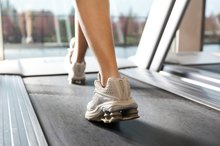Hives Caused by Exercise
Hives -- raised, itchy welts on your skin -- can develop as an allergic reaction to exercise. If exercise-induced hives don't resolve within 10 minutes, call your doctor. If hives are accompanied by difficulty breathing, stomach cramps, nausea, dizziness, low blood pressure, swelling of the tongue or face or fainting, these symptoms may indicate a rare but life-threatening condition called full-blown anaphylaxis, or anaphylactic shock; seek emergency medical care immediately. Exercise-induced hives can usually be controlled with medications, so you don't have to forgo activity. Your doctor may prescribe an epinephrine injection pen to carry with you.
Features
Known as urticaria, hives may appear during exercise or immediately after. They can be either white or reddish in color, and are often surrounded by an area of darker red. They don't occur after every exercise session, but sporadically; you may experience an allergic reaction once and then go months without one. Experts believe that food can play a role in exercise-induced hives. According to a 2007 review published in "Allergy, Asthma & Clinical Immunology," food-dependent exercise-induced anaphylaxis is easily overlooked and often underdiagnosed. Wheat is the most common trigger, followed by buckwheat, pistachios, apples, oranges, corn, mushrooms and celery. Medications -- particularly aspirin -- can also influence exercise-induced hives; researchers note the drug may increase gastrointestinal absorption of food allergens. Hives resulting from exercise are generally divided into two categories: cholinergic hives, which appear as a result of body warming; and classic exercise-induced anaphylaxis.
- Known as urticaria, hives may appear during exercise or immediately after.
Cholinergic Urticaria
Swollen Lips & Eyes After Running on a Treadmill
Learn More
With cholinergic urticaria, or heat-induced hives, the welts are normally around 2 to 5 mm in diameter, and usually begin on the neck. "American Family Physician" reports that it is rare for cholinergic urticaria to lead to the low blood pressure that can mark full-blown anaphylaxis. Doctors believe that the sympathetic nervous system triggers the release of histamine responsible for cholinergic hives. To determine if you have cholinergic hives, your doctor will take a medical history; if you have had hives while in a hot bath or shower, this makes a diagnosis of cholinergic urticaria more likely. Your doctor may also conduct a passive warming test, in which you are exposed to hot temperatures or a hot bath and then checked for increased histamine levels. In addition to exercise and body warming, emotional stress can also cause cholinergic urticaria.
- With cholinergic urticaria, or heat-induced hives, the welts are normally around 2 to 5 mm in diameter, and usually begin on the neck. "
- To determine if you have cholinergic hives, your doctor will take a medical history; if you have had hives while in a hot bath or shower, this makes a diagnosis of cholinergic urticaria more likely.
Exercise-Induced Anaphylaxis
Hives appearing from exercise are usually larger than cholinergic hives; welts larger than a centimeter in diameter are considered an indication of EIA. Itching, choking sensations, stomach cramps, headache and wheezing are additional indications. EIA is most common after jogging or running, but "American Family Physician" notes that EIA has also been reported after dancing, volleyball and skiing as well. Symptoms can last from 30 minutes to four hours after exercise. Your doctor may test you for EIA by having you perform an exercise challenge test, but because EIA appears so unpredictably, a negative result does not mean you don't have the condition.
- Hives appearing from exercise are usually larger than cholinergic hives; welts larger than a centimeter in diameter are considered an indication of EIA.
- EIA is most common after jogging or running, but "American Family Physician" notes that EIA has also been reported after dancing, volleyball and skiing as well.
Treatment and Prevention
Exercise & Scalp Itching
Learn More
If you experience hives after exercise and have never had them before, see your doctor for diagnosis. If you have been diagnosed with EIA, you should always carry your EpiPen and avoid exercising alone; schedule workouts with a partner who is aware of your condition and capable of administering basic life support and epinephrine. Stop exercising right away and give yourself epinephrine at the first sign of itching, flushing or hives. If hives don't disappear -- or if they worsen -- seek medical treatment. Your doctor may advise you to delay your workouts until four to six hours after eating, and to avoid aspirin and other non-steroidal ant-inflammatory drugs before exercising.
- If you experience hives after exercise and have never had them before, see your doctor for diagnosis.
- If you have been diagnosed with EIA, you should always carry your EpiPen and avoid exercising alone; schedule workouts with a partner who is aware of your condition and capable of administering basic life support and epinephrine.
Related Articles
References
- "American Family Physician"; Exercise-Induced Anaphylaxis and Urticaria; Robert G. Hosey; M.D. et al.; October 2001
- "Allergy, Asthma & Clinical Immunology"; Food-Dependent Exercise-Induced Anaphylaxis: A Case Related to Chickpea Ingestion and Review; Chet G. Wong and Sean R. Mace; Vol. 3 2007
- Fine LM, Bernstein JA. Guideline of chronic urticaria beyond. Allergy Asthma Immunol Res. 2016;8(5):396–403. doi:10.4168/aair.2016.8.5.396
- Sachdeva S, Gupta V, Amin SS, Tahseen M. Chronic urticaria. Indian J Dermatol. 2011;56(6):622–628. doi:10.4103/0019-5154.91817
- American College of Asthma, Allergy, & Immunology. (2014). Types of Allergies: Hives (Urticaria).
- Casale TB. Omalizumab for Chronic Urticaria. J Allergy Clin Immunol Pract. 2014;1:118-9.
- Kahn DA. Alternative Agents in Refractory Chronic Urticaria: Evidence and Considerations on their Selection and Use. J Allergy Clin Immunol Pract. 2013;1:443-40.
Writer Bio
Carol Sarao is an entertainment and lifestyle writer whose articles have appeared in Atlantic City Weekly, The Women's Newspaper of Princeton, and New Millennium Writings. She has interviewed and reviewed many national recording acts, among them Everclear, Live, and Alice Cooper, and received her Master of Fine Arts degree in writing from Warren Wilson College.








